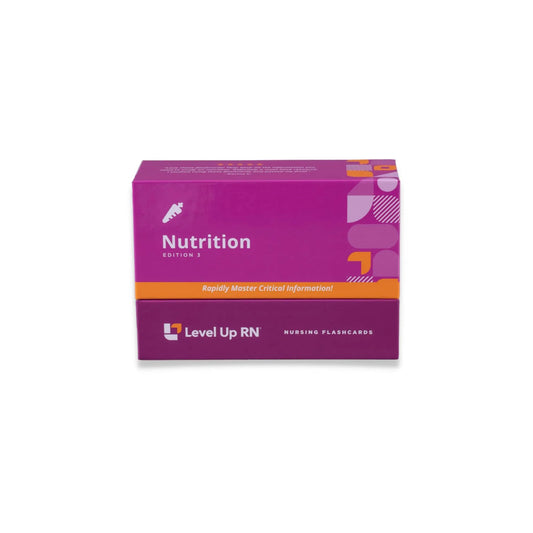Hi, I'm Cathy with Level Up RN. In this video, I'm going to continue my coverage of topics from our Level Up RN nutrition flashcard deck. Specifically, I'll be talking about nutritional guidance for a number of endocrine disorders, except for diabetes, which I covered in a separate video in this playlist. At the end of the video, I'm going to give you guys a quiz to test your understanding of some of the key points I'll be covering. So definitely stay tuned for that. And if you have our flashcards, go ahead and pull out your flashcards on endocrine disorders so you can follow along with me.
Let's start off by talking about diabetes insipidus. With this disorder, we have insufficient antidiuretic hormone or ADH being released from the pituitary gland, or the patient's kidneys are not responding appropriately to the ADH that is being released. In either case, this causes the patient to urinate large amounts of dilute urine, which in turn can result in fluid volume deficiency. Patients with diabetes insipidus are advised to increase their fluid intake in order to prevent dehydration. In addition, patients with nephrogenic diabetes insipidus, which is where the kidneys are not responding appropriately to ADH, a low-sodium diet is often recommended to decrease urine output.
Let's now talk about syndrome of inappropriate antidiuretic hormone or SIADH. With this disorder, we have the excess release of ADH from the pituitary gland, which causes the kidneys to reabsorb water but not sodium. So a patient with SIADH will urinate very little and instead retain all that extra fluid which causes fluid volume excess. Patients with SIADH are often advised to restrict their fluid intake, and sodium may also need to be replaced in cases of severe hyponatremia.
Now let's talk about Addison's disease. With this disorder, we have the inadequate secretion of hormones from the adrenal cortex, which results in dehydration, electrolyte imbalances, and hypoglycemia. In terms of nutritional guidance, patients with Addison's disease are often advised to increase their intake of salt. If the patient experiences an Addisonian crisis, then IV fluids would be administered to increase the patient's blood pressure along with dextrose to address the patient's hypoglycemia.
Next, we have Cushing syndrome, which is a disorder characterized by the overproduction of cortisol by the adrenal cortex. This disorder causes a number of adverse signs and symptoms, such as weight gain and hypertension due to fluid retention, bone loss, muscle wasting, and diabetes just to name a few. In terms of nutritional guidance, individuals with Cushing syndrome are advised to restrict their intake of fluid and sodium to help control fluid volume, increase their intake of protein to help prevent muscle loss, and then increase their intake of calcium and vitamin D in order to prevent bone loss.
Next, let's talk about hypothyroidism, which is an endocrine disorder characterized by the inadequate production of thyroid hormones by the thyroid gland. Patients with hypothyroidism are at increased risk for constipation and weight gain. So patients are often advised to increase their intake of fiber and fluids to help prevent constipation and then follow a calorie-controlled diet to help prevent weight gain.
Finally, let's touch on hyperthyroidism, which is where we have the excess release of thyroid hormones by the thyroid gland, which places the patient in a hypermetabolic state. In terms of nutritional guidance, when the patient is in a hypermetabolic state, they will require additional calories and protein. However, after treatment to remove or destroy the thyroid gland, calorie intake should be decreased in order to prevent weight gain.
All right, it's quiz time, and I have four questions for you.
Question number 1, nutritional guidance for a patient with diabetes insipidus includes restriction of fluid intake, true or false?
The answer is false. Diabetes insipidus causes water loss, so patients will be advised to increase their intake of fluids.
Question number 2, would fluid and sodium restrictions be appropriate for Addison's disease or Cushing's syndrome?
The answer is Cushing syndrome. Addison's disease can cause dehydration and hyponatremia, so fluid and sodium restrictions would not be appropriate. On the other hand, Cushing's syndrome causes fluid volume excess and hypertension, so fluid and sodium restrictions would be appropriate.
Question number 3, increased calcium and vitamin D is recommended for individuals with Cushing syndrome, true or false?
The answer is true. Bone loss is a key symptom of Cushing syndrome, so increased intake of calcium and vitamin D would be appropriate.
Question number 4, why would a patient with hypothyroidism be advised to increase their intake of fiber and fluids?
The answer is to prevent constipation, which is a key symptom of hypothyroidism.
All right. That's it for this video. I hope it was helpful. Take care and good luck with studying.


